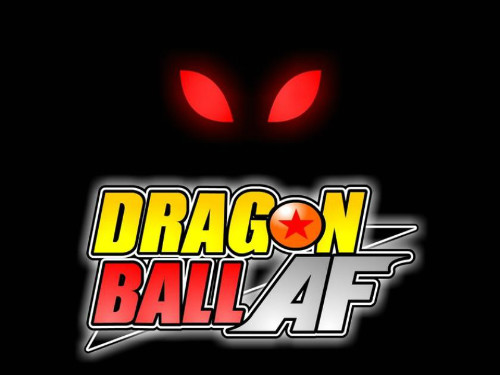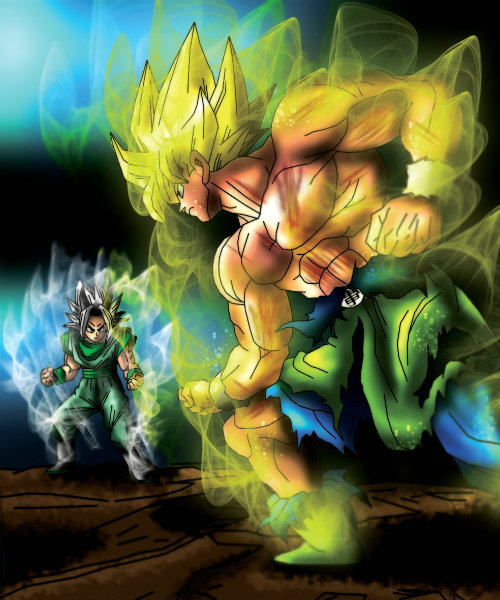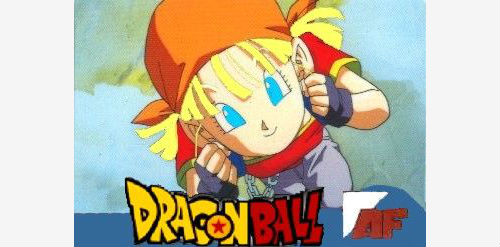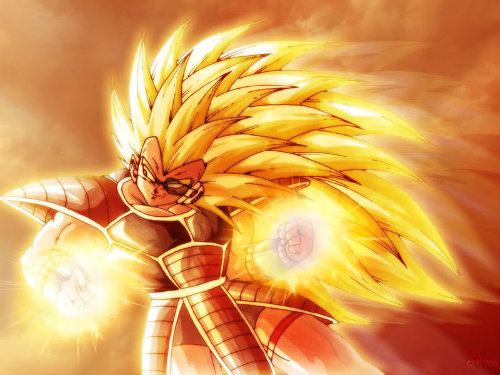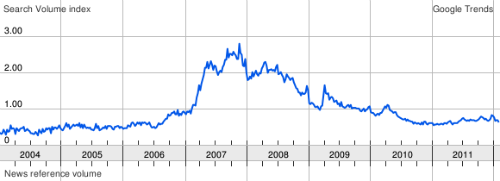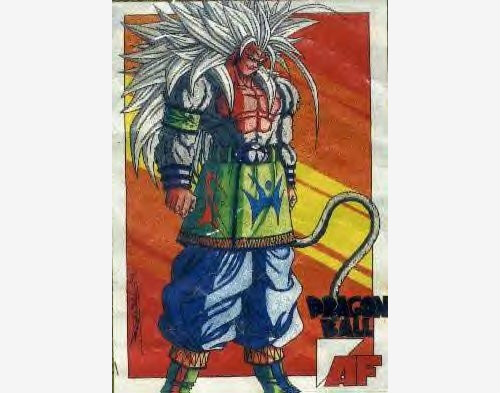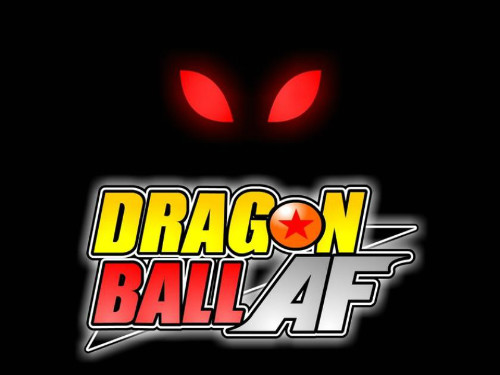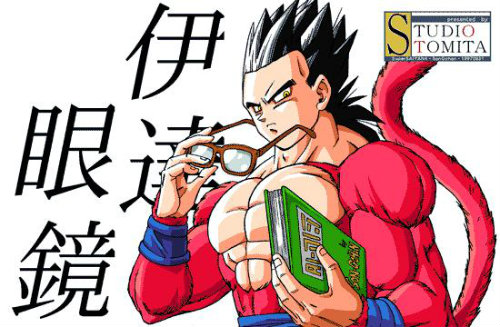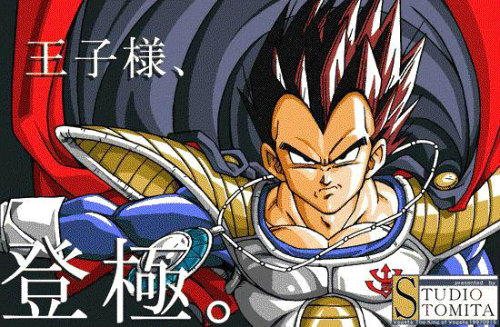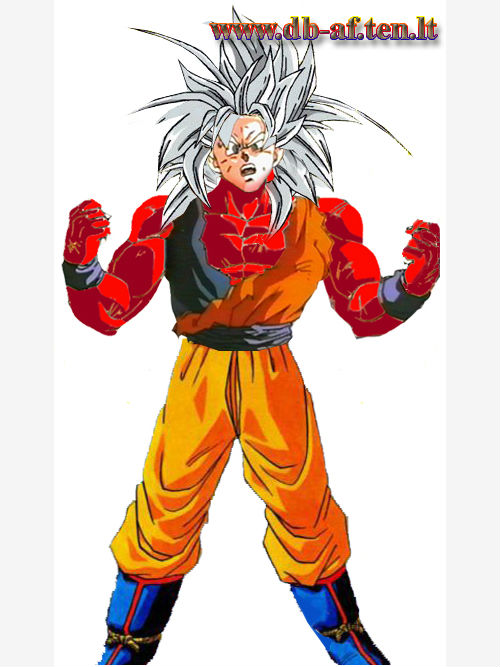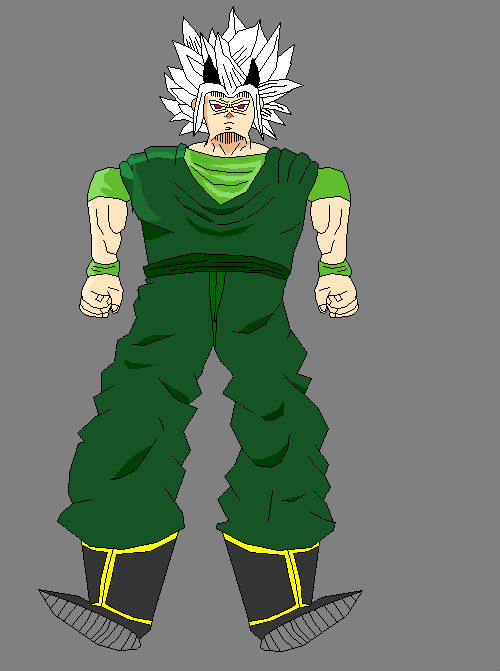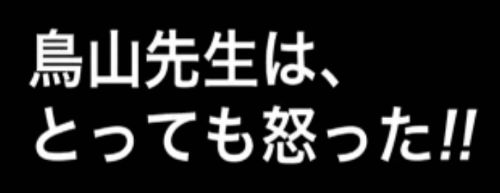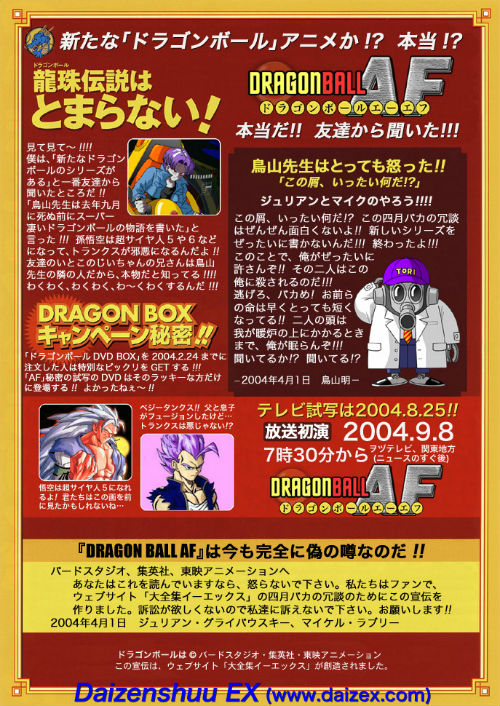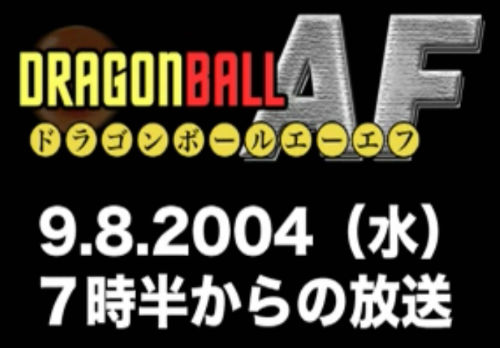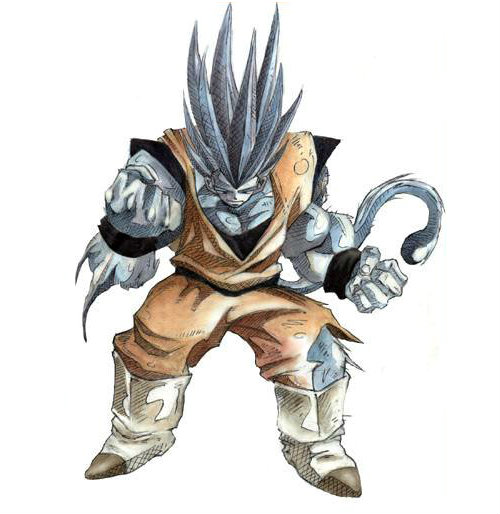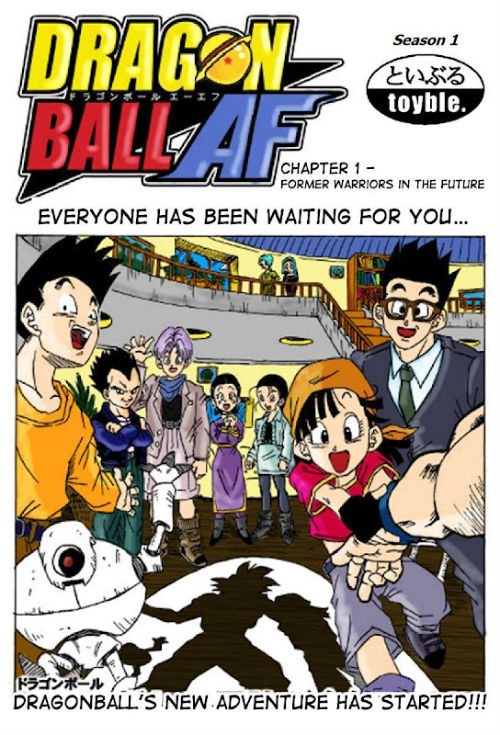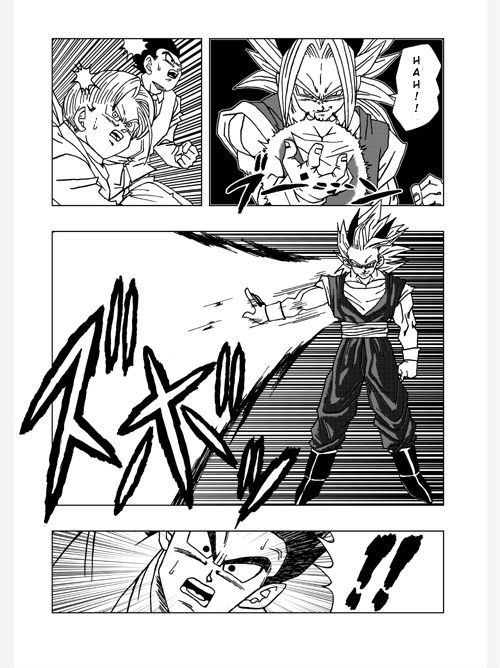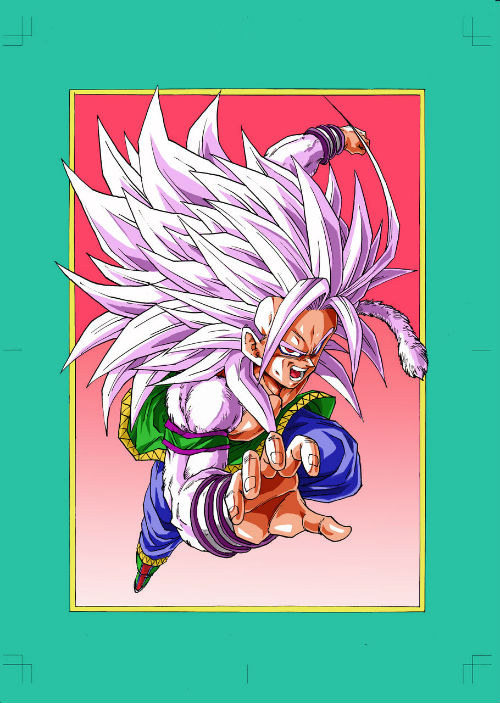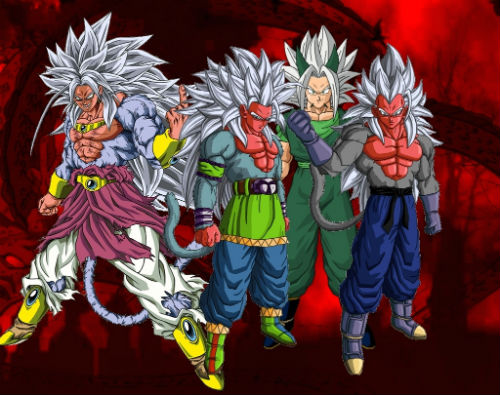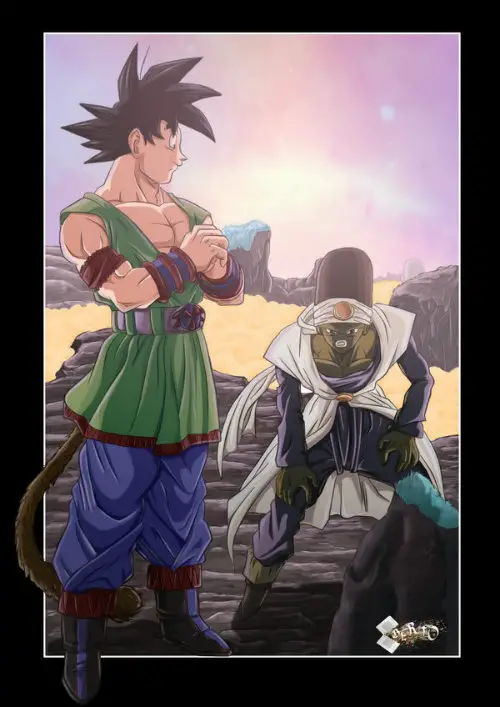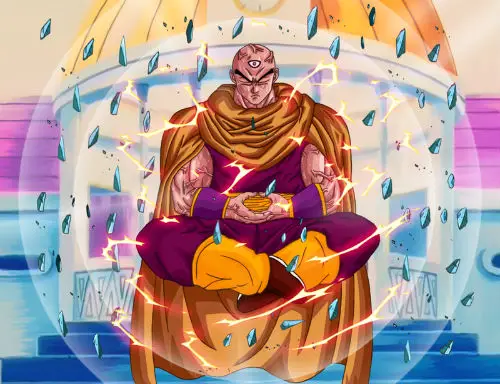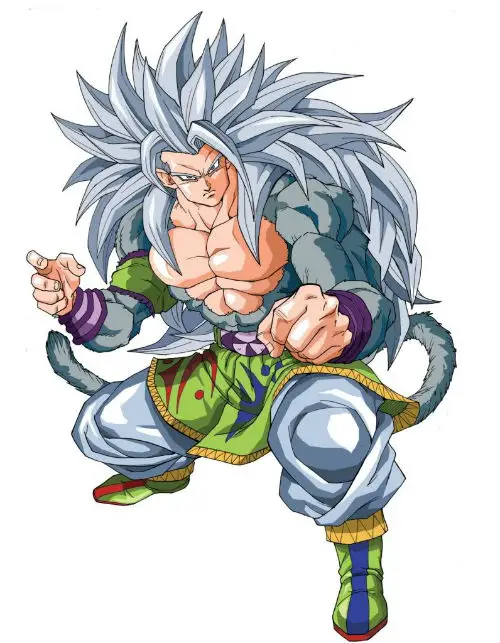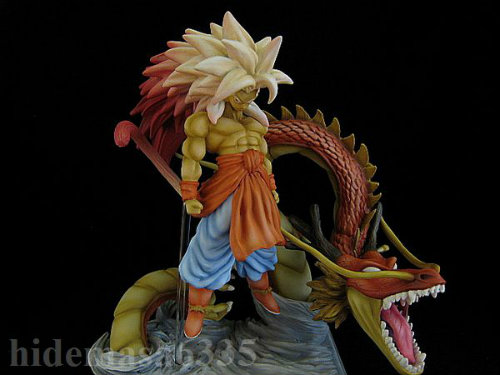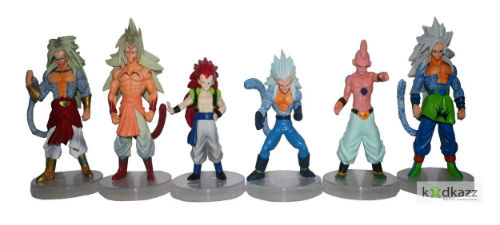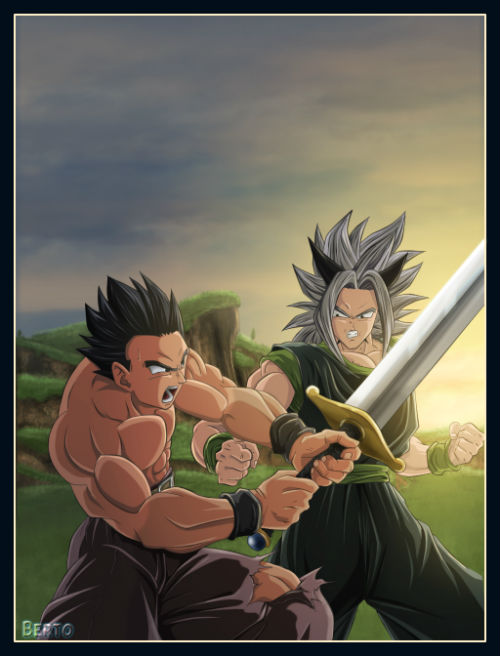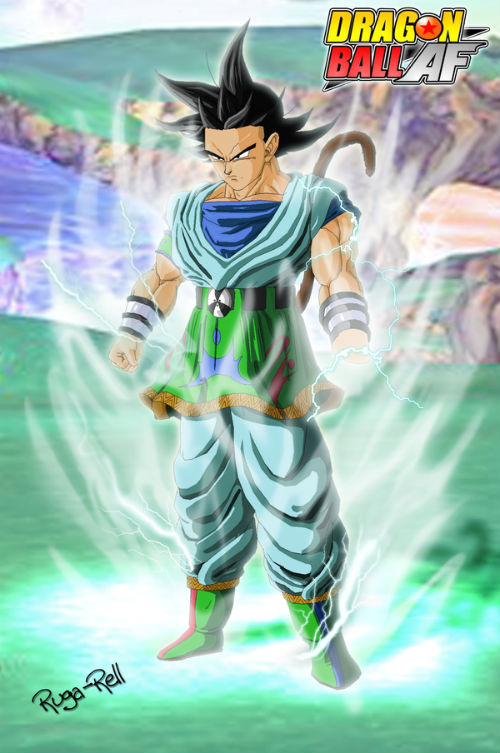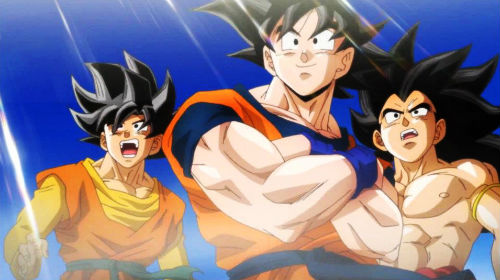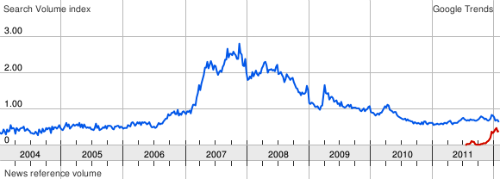Dragon Ball AF Explained
Dragon Ball AF. You hate it, you love it, or maybe you’ve never heard of it. In any case, I doubt you know the full story.
It’s a truth that Dragon Ball fandom is and always has been intense. Regardless of their preferred version, Dragon Ball fans absolutely love their Dragon Ball.
Just before Dragon Ball GT concluded its original television run in Japan in 1997, a rumor spread about a new official series called Dragon Ball AF. Fans wanted the series to continue.
The only problem is that it was never true.
And you might suppose we could end this article right here. But as with everything involving Dragon Ball and its impact across the world, there’s a lot more to the story.
Dragon Ball AF was originally the creation of an unknown fan that evidently had a strong desire for a fourth Dragon Ball anime series.
A single image appeared on the web of a hypothetical Super Saiyan 5 Goku with a “Dragon Ball AF” logo on it, and from there it spread like wildfire.
The rumor grew gradually over the years and took on a life of its own, spawning many fan creations, illustrations, videos, episode listings, action figures, and even high quality fan manga based on the collective rumors.
For example, who is this guy fighting Goku?
Images like this confused the heck out of new Dragon Ball fans. And those who circulated lies about Dragon Ball AF preyed on the gullible nature of fans who simply wanted to see more of their favorite characters.
The desire for a new Dragon Ball series is so strong that even today the rumor is still actively spread that Dragon Ball AF is the next official series from Toei, and that the videos and images “leaked” on YouTube will arrive in “the next year or two.” New fans continue to fall for it, and the cycle continues.
Despite all the time that it has been around, if you search online for an explanation of Dragon Ball AF, you will only find bits and pieces of info. A short wiki article here, some crudely Photoshopped images there, a guy saying it’s not real while another screams back that it is, followed by immature insults and a link to fan made manga. There are, maybe, two good sources on the topic. Unless you spend hours putting the pieces together, you’ll be confused or simply dismiss the whole thing outright.
Because of Dragon Ball Z Kai’s and Dragon Ball GT’s second syndication on TV, there is now a new generation of Dragon Ball fan looking to see what happens next.
With the realization that people are still being confused, I set out to discover the true story behind Dragon Ball AF and write the definitive article.
Along the way I found a captivating story to tell.
The Dragon Ball AF Trend
Before we get into the details of Dragon Ball AF, I’d like you to see just how popular it is.
I’ve been a fan of Dragon Ball since 1997 when it first aired on Cartoon Network’s Toonami block and Midnight Run. Even back then I remember seeing rumors about it on the Internet.
I’ve never done an article about Dragon Ball AF because frankly, I didn’t think it was worth digging into. As a kid I realized it wasn’t real after 5 seconds of seeing the first image. It was obviously poor quality and made by fans. I was curious, but since it wasn’t genuine I thought the rumor would be dead in a few years.
But Dragon Ball AF continues to be talked about. Somehow people are still falling for the rumors. In fact it’s even more popular now than when Dragon Ball Z was syndicated on national TV.
Consider the following search trends.
According to Google Adwords’ keywords tool, the term “dragon ball AF” received 1,000,000 global monthly searches on average in the previous 12 months (January, 2011 to January, 2012). And at the date of this article it has 3,490,000 Google search results.
For comparison, “dragon ball z kai” received the same 1,000,000 global monthly searches.
This means Dragon Ball AF is currently 100% as popular of a search term as Dragon Ball Z Kai, and it’s not even real! Nor is it backed by millions of dollars in marketing.
How is that possible? The rumor started in 1997 and people are STILL actively looking for it 15 years after its creation?!
Query data for Dragon Ball AF on Google only begins in 2004, when Google began recording trend data. We can see that its popularity grew gradually over the years. There was a huge spike in 2007 for Dragon Ball AF information, most likely coinciding with the end of Dragon Ball GT’s syndication across the world by fans hungry for more. Then this gradually dropped over the next few years. But there are more queries for it now between 2011 and 2012 than there were between 2004 and 2006.
The term “dragon ball” has 30,400,000 monthly queries and “dragon ball z” receives 16,600,000.
Comparing that to two other large series, we see that Star Wars receives 24,900,000 queries and Star Trek receives 4,090,000 queries. This helps prove that Dragon Ball fandom on the internet is still very much alive, as searches for “dragon ball” eclipses both “star wars” and “star trek” combined.
What’s crazy is that the entirely fan created “dragon ball AF” is so popular when compared to these legitimate series, at 1,000,000 queries.
Even more shocking, there are multiple Dragon Ball AF videos on YouTube with over 9 million views, 8 million views and 5 million views, while the incredibly popular Dragon Ball meme, “It’s Over 9,000!” only has 7 million views total. Is Dragon Ball AF really more popular than “Over 9,000!”?
Some fans have speculated that when the rumor began in 1997 it was on April Fool’s Day (April 1st), and this is why it’s called AF. There’s no proof of this, but if so, it seems like the whole world fell for it, because Dragon Ball AF is exponentially more popular now than when it started.
Where did Dragon Ball AF Come From?
Dragon Ball GT completed its run in 1997 and even though fans knew it was the end, everybody was hungry for more.
GT was for most people a disappointment, as it was written by someone other than Akira Toriyama. In this case, Matsui Aya, the Series Organizer at Toei. Fans wanted Akira Toriyama at the creative helm again, like he was for Dragon Ball and Dragon Ball Z.
It’s not known where the rumor started (possibly Spain), but it mentioned a new series called Dragon Ball AF, where Goku reaches Super Saiyan 5, Pan turns Super Saiyan, and Raditz comes back alive somehow, also as a Super Saiyan.
The first image associated with Dragon Ball AF was of Super Saiyan 5 Goku.
Nobody knew where it came from. Rumors said it was from a fan made manga (Dojinshi), but no proof was ever provided. Others have said that it’s not Goku at all, rather his son Xicor.
The AF logo was completely fabricated, but even so, fans speculated what it could mean. It was rumored to stand for “After Future,” because the series took place 200 years after the end of GT. Others said it stood for “Alternate Future,” or “AfterliFe,” while those who didn’t believe in it, as they still explain today, said it stood for “April Fools.”
A few crudely drawn images appeared of Goku Photoshopped to have different color hair, Pan with golden hair, Super Saiyan Raditz and other seemingly random combinations of Fusioned characters, like Vegetunks, the Fusion of Vegeta and Trunks.
Meanwhile, Super Saiyan 5 was surpassed by Super Saiyan 6. Goku was now “Evil Goku” because he had been corrupted by the power of the dragon balls and it was up to Vegeta to stop him. And a new set of Potara earrings could now fuse 3 people together, instead of only 2.
Fans argued endlessly about whether or not these were real, with some stating that their “friend in Japan” confirmed it was. Others said, “Yeah, it’s real, I use these characters in my fan fiction and my role playing games,” naively blurring the line between fan made fiction and official releases.
This mess of “real” or “not real” confused others looking for the truth.
What may have been a couple months or perhaps years later, two more images appeared of Super Saiyan 4 Gohan and “King Vegeta.”
These two images were exquisitely detailed and looked very professional, as if they could have been done by Toei staff or even Akira Toriyama. These caused a huge surge in the number of believers and were used as validation that Dragon Ball AF was real.
But on each image was a logo that read, “Studio Tomita.” Who was Studio Tomita? Nobody knew, so more rumors flew around. Maybe it was a company working with Toei, or maybe it was Toriyama’s studio under a different name?
It was neither. Turns out that Studio Tomita was a very talented fan (or group of fans) who drew illustrations of their favorite anime characters. They had a website with a few images on it, but oddly, neither of these two Dragon Ball images was there.
There was however a note that said, “If you accessed this homepage in order to obtain an image of “DRAGON BALL”, you will be discouraged. I do not put an image of “DRAGON BALL” in this homepage currently. And I reply to a request of somebody and do not intend to send an image. I’m sorry.”
This tells us that if even Studio Tomita did create them, they now wanted nothing to do with these images or to be affiliated with Dragon Ball. Most likely due to the amount of emails they received from rabid fans.
But that was all it took. These images sparked the flames of what would become a much larger fire.
The Rise of Dragon Ball AF
It was now sometime between 1999 and 2001. With all this Dragon Ball AF content out there, fans became excited and eagerly awaited this new series.
And they waited.
And waited.
And it never came, because it was never real.
There were no official screen shots or episode clips, no advertising, merchandise or articles in Japanese media.
All the while fans were rapidly producing new content and slapping the Dragon Ball AF logo on it, adding to the confusing mess.
Rumors, fan art and outlandish Fusions of characters fed into one another and created a giant, endless cycle of rampant lies and immature stupidity.
Free websites like Geocities and Angelfire became popular outlets for Dragon Ball fans wanting to “prove” the existence of Dragon Ball AF. They would create a site, post the images, and suddenly Dragon Ball AF seemed a bit more real in the mind of an average web surfer. After all, wherever you looked, there it was!
Fans jumped on message boards saying, “Hey, I heard about a new Dragon Ball series!” Then other fans would get into the conversation and it would derail in various ways.
More established sites also promoted the series. While doing research for The Black Goku article, I found a news post about Dragon Ball AF on the archived DaBlackGoku.com homepage from October 9, 2000. It said, “Hello Everyone. I found some interesting information on the Dragon Ball AF series that everyone has heard rumors about.”
This was in the year 2000, and he was talking about it being a rumor back then and passing it off as news. It’s still a rumor today and people still pass it off as news!
With the advent of high speed broadband internet, YouTube became increasingly popular and fans started to put their work in video form. This immediately led to claims that what they posted was the “official” anime, and that their “leaked” footage was real.
Fans created back stories, episode listings, and even more character splices.
Several “Official Dragon Ball AF” websites sprung up claiming to sell tapes.
Dragon Ball Z was airing on TV at the time, and was sending millions of new fans onto the internet. Those who were naïve bought into it.
That’s really all there is to Dragon Ball AF for the next few years. The inertia of fandom ensured that it kept growing and reaching more people through different platforms.
The Daizex.com April Fool’s Joke
The year was 2004 and a search on Google for “Dragon Ball AF” generated 1,170,000 results. This collective fan creation had become extremely popular.
Dragon Ball Z was still very popular in America and Dragon Ball GT was beginning to be sold on tape and air on TV.
The website DaizenshuuEX had grown over the years to become, in their own words, the “most authoritative and complete stop online for anything and everything DragonBall.” And it’s true. Daizex.com has always provided the latest and most up to date official news regarding the Dragon Ball series. Their forum had (and still has) a reputation for its hardcore and extremely knowledgeable fans. Whatever was posted on the main news page was inarguably official.
That said, the owner, Mike “VegettoEX” LaBrie had a yearly tradition of playing an April Fool’s prank on the community.
He knew better than anyone that Dragon Ball AF wasn’t real, and everyone in the community was tired of hearing about it. Because there had not been any official media reports, advertisements, or video clips surrounding Dragon Ball AF, he decided to make some and act like they were real!
He later said on his site, “If we were going to do this, it had to be insane. Everything had to scream of quality, and above all else, it had to be in Japanese and look / sound authentic.”
They created a print advertisement and a commercial to share on YouTube. Mike said, “The print-ad came first. Julian began work on it, typing up some of the text using a pre-existing “Dragon Box” Japanese ad as a template.”
The original Japanese Dragon Ball ad was modified with images of content from Dragon Ball AF, and some comedic Japanese text was added. Text that, for anybody who spoke Japanese, would immediately give away the fact it was a joke. But for non-Japanese speaking fans everywhere else it would look authentic.
“Soon Mike began work on the video commercial.” Mike had become a talented video editor from his years of working on Dragon Ball music videos, and made it his profession. He very skillfully ripped audio from One Piece and Revolutionary Girl Utena, featuring the same voice actors that are in Dragon Ball, with classic moments from the series. Interspersed throughout the dialogue were Japanese title cards, which just like the advertisement above, would clearly be obvious as a joke to Japanese readers.
Mike released the ad and video on April Fool’s Day and he updated his site to reflect the news (as if it were official), stating it would air September 8, 2004. The site said, “On this date, a new series was officially announced in a mailing to frequent buyers of the DB Kanzenban volumes. And best of all, in a nod to fans who were so anxious for a sign, the series is going to be called–get this–DragonBall AF!!!”
As a result, not everybody realized it was a joke. And that was the point.
He later said, “It wouldn’t be an April Fool’s Day prank if we didn’t cause havoc across the internet. We knew we’d end up fooling some people, and we knew that people would be talking about it.”
This had rather large consequences on the Dragon Ball AF community, because most of them were young, naïve, and didn’t speak Japanese.
One fan named Jose Gonzales was aware that it was a joke and wrote to them, saying, “I hope you realize that because of this little stunt there’s going to be an outpouring of kids freaking out all over the net and it will almost certainly be seen as proof of the existence of AF.”
Of course that is exactly what happened. People shared it left and right, posting on message boards about how they now had proof that “the new Dragon Ball series is real!”
Mike had a lot of fun with it though, saying in response, “I’m not going to regret it and there’s no hate mail to speak of. It’s been a blast, and it’s awesome to see that people are enjoying it and getting a kick outta it.”
Even though a day later he completely admitted to the joke, once you put an image on the internet, it’s their forever. And these images and videos were pushed around by every Dragon Ball AF loving fan that could find them.
I have a copy of the video, but for the sake of making sure that this doesn’t happen again, I’m not going to post it online. Plus it’s not my property to rightfully post.
Why did people believe the ads? Probably for the same reasons they believed in Dragon Ball AF in the first place!
Meanwhile, in the fan driven evolution of Dragon Ball AF, there were now 10 levels of Super Saiyan!
Yes. That is Super Saiyan 10 Goku, apparently.
Dragon Ball AF Fan Manga
Fan manga and fan fiction have always surrounded the Dragon Ball series.
Despite the wild images, there had never been a serious Dragon Ball AF manga. Most of the illustrations were poorly drawn.
These series tried to pass themselves off as real while riding the wave of Dragon Ball AF fandom. They would either share that name, or come up with their own, such as Dragon Ball V, Dragon Ball ST, Dragon Ball AE, and Dragon Ball DR. Basically any other letters you want to add to the end of “Dragon Ball.”
Over time, Dragon Ball AF became the default go-to name for any type of fan creation. It was synonymous with fan made.
That changed in 2006 when a very talented artist in the Toriyama style finally put pen to paper and created a Dragon Ball AF worthy of the name.
Toyble (pronounced Toiburu) deserves credit for making something original, beautifully illustrated and true in spirit to the series. At least for the most part.
The story is about the illegitimate son of Goku, Zaiko (otherwise known as Xicor), who was born by a female Kaioshin that stole Goku’s seed in a dream, while he slept. The child was half-man, half-god, and more powerful than all of the other warriors, including Super Saiyan 4 Vegeta and Super Saiyan 4 Gohan. It’s up to Goku to save the day.
Toyble is unique because he clearly states on his site, “This site and its publications have nothing to do with the original author [Akira Toriyama] and has no relationship with him. Dragon Ball AF is an interpretative story.”
Even so, Toyble’s Dragon Ball AF (ドラゴンボールAF, Doragon Bōru AF) is one of the major reasons that Dragon Ball AF rumors continue to linger. His excellent drawings and story (that weaved many of the existing rumors together) serve as the prime example the stalwart fans present when insisting Dragon Ball AF is real. The images look authentic, so fans jump to the conclusion that they are.
Another artist named Young Jiji has also done a similar Dragon Ball AF manga with an equally impressive Toriyama style of art, making it seem real.
These are really the only two manga with a high enough level of quality I feel are worth mentioning.
Dragon Ball AF Videos
Dragon Ball AF videos? What is there to say, really?
The quality is guaranteed to be poor. They usually consist of edited clips and drawings from Dragon Ball Z and Dragon Ball GT, with the colors changed or with weird effects added on top.
They won’t be real. The creators try to pass them off like it’s a new series, just as they’ve been doing since this began.
They’ll be annoying. Backed by odd music or simply poorly edited, with ads pointing to something unrelated as an added bonus.
http://www.youtube.com/watch?v=-2vHuB0rDdg&feature=fvwrel
Other times the videos will simply be the animated intro footage for the Dragon Ball video games, such as Dragon Ball Z Ultimate Tenkaichi, Dragon Ball Heroes or Dragon Ball Online. They are labeled as Dragon Ball AF or the “New Dragon Ball Series,” but only exist to prey on those who don’t know otherwise.
http://www.youtube.com/watch?v=SUkGZFBuwPs
Despite these drawbacks, many of these videos have more than 9 million views! That makes them some of the most popular videos on YouTube.
Why so popular? Because everybody wants the next Dragon Ball series, and they want it now! Remember, Dragon Ball fans love their Dragon Ball!
Some less scrupulous video editors capitalize on this fandom and post videos that have the title of “Super Saiyan 7 to 10,” and so on, but then they talk about things unrelated to Dragon Ball. They bait and switch people to click and watch their crap.
They also feature really odd and unique characters put together via Fusion, or show strange Majin Buu absorptions of other characters, such as Majin Buu after absorbing Freeza. Naturally, the Super Saiyan levels continue to rise, going from Super Saiyan 10 to Super Saiyan 20 and even Super Saiyan 50! Goku’s golden yellow hair is insanely long.
http://www.youtube.com/watch?v=Z67XXZtQgGc
The creators lie about AF’s existence, or only tell half truths to benefit themselves. For example, from the description of one video it says, “Note everyone: Dragonball AF is REAL, It already has comics based on it and action figures. Comment And Subscribe If You Want To Support Dragonball AF.” They are again passing “real” off as “official,” which it isn’t.
Lastly, they pull content from the Dragon Ball games and try to connect it to Dragon Ball AF. The game Dragon Ball Z Budokai Tenkaichi 3 has alternate outfits showing Super Saiyan 4 Gogeta with white hair, which fans say is all too coincidentally like Super Saiyan 5 Goku to be a coincident.
Fans wondered why the developers in Japan chose these colors. Maybe they did it on purpose to allude to Dragon Ball AF? Or maybe it was foreshadowing of what Toei was going to release “in the next year or two.”?
A few videos that went over 9,000,000 views were posted in 2007, while one with 3,000,000 views was posted as recently as Jun 24, 2010. None of them are real, but the fandom is still alive so people continue to play this silly game of lies.
Suffice to say, if you were falling for it, now you know better.
Dragon Ball AF Images
In the beginning, the Dragon Ball AF images were awful. But now the fans have really taken to it, and more talented artists have produced better art based on these fan fiction characters. Here’s a bit of it.
Dragon Ball AF Action Figures
The fandom has reached such a point that Dragon Ball action figures and models have been created.
I find this interesting. Dragon Ball AF is a fan created series but people apparently spend their money on these models, buying into the fandom, official or otherwise.
It’s as if Dragon Ball AF has become official simply because of consumer demand.
The Heart of a Dragon Ball Fan
Dragon Ball AF is an unofficial, fan made creation that has grown in such leaps and bounds that it’s now on par with Dragon Ball Z Kai in terms of search requests, and even has its own merchandise.
Fans wanted a new Dragon Ball series but Akira Toriyama said he wouldn’t create any more Dragon Ball manga. Toei didn’t provide them with a new Dragon Ball anime, either. With a couple of exceptions, most of what has arrived is rehashed and “refreshed” content.
So what did fans do in the absence of a new series?
They made it themselves!
They wanted Dragon Ball AF to be real, so they made it real.
It all began with a single image of Super Saiyan 5 Goku. Then two more images appeared of Super Saiyan 4 Gohan and “King Vegeta.” This somehow led to new characters being developed, a complete storyline, and episode listings. From there it got mashed together repeatedly over the years, with more and more piled on top of itself.
No matter how crudely drawn, poorly Photoshopped, oddly written, or strangely fused together, Dragon Ball AF has grown to represent the dreams and desires of Dragon Ball fans across the world.
That’s the real story of Dragon Ball AF. The story behind the scenes.
The Dragon Ball fans themselves. Their aspirations and desires.
Why do people want a new Dragon Ball series so badly? What moves them to draw, color, animate, and create their own manga? And what makes people want to believe in, promulgate lies, and trick people into thinking like them… all through the vehicle of Dragon Ball?
I believe Dragon Ball speaks to a part of our humanity and appeals directly to our core. All that fans want is a new series at a high level of quality so they can continue to have the same exhilarating feeling they did the first time they saw Goku transform into a Super Saiyan, or when Gohan defeated Cell with the Father-Son Kamehameha.
It never arrived externally, so fans made it internally. Then they shared it.
Like Cell, Dragon Ball AF is an artificial monster that continues to grow and evolve, becoming more refined as it goes. But instead of seeking to destroy, it seeks to bring more fans into its collective grip, making them hope, dream, and become involved with something bigger than themselves. A community of like minded people who speak the same language and love the same thing.
Once you get fans hooked on a series and then end it, what else are fans to do? Be patient and let it go?
Ha! That’s not how Dragon Ball fans work!
Emerging Dragon Ball Trends
As if Dragon Ball AF weren’t enough, in late 2011 a new rumor mysteriously spread across the internet about yet another new Dragon Ball series, called Dragon Ball Hoshi. Exactly like Dragon Ball AF when it began, this one is also fake and an odd combination of truths and lies.
Similar to Dragon Ball AF, Dragon Ball Hoshi has quickly grown in popularity, as seen in this Google Trends image comparing the search trends for both.
But explaining Dragon Ball Hoshi will have to wait for another day.
[Update on Feb 19, 2012. Here is Dragon Ball Hoshi Explained.]
One of the goals of this article was to present the truth of Dragon Ball AF in a logical, rationale way, so that the genuine fans will understand it and stop being fooled by (and then promote) the lies.
Failing that, if it still becomes even more popular at least this article will serve to bring people up to speed on what Dragon Ball AF is all about.
As I mentioned in the intro, I believed Dragon Ball AF was best left un-discussed and that it would eventually die out.
How wrong I was!
But do me a favor. After reading this article, please stop going on the message boards and forums to tell people you’ve heard of a “new Dragon Ball anime series!!”
We’ve got enough of those guys out there already.
Oh, who am I kidding? Dragon Ball fans love their Dragon Ball! This will probably never stop!
Dragon Ball AF Roxors! OMG Broly’s Power Level is Maximum!! Super Saiyan 50 Goku for the win!!!
Resources
Dragon Ball Wiki Article on Dragon Ball AF
Daizex.com Aprils Fool’s Day Prank
Daizex.com Forum Post on Original DBAF Image
Desire Campbell’s Collection of Toyble’s Dragon Ball AF manga
The “Official” Dragon Ball AF Site
